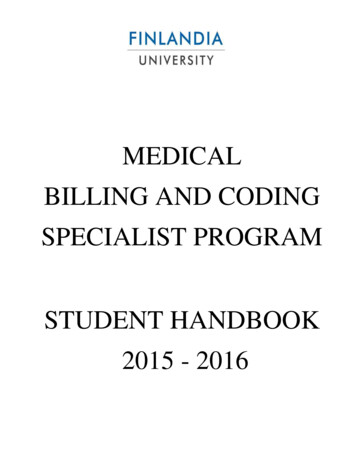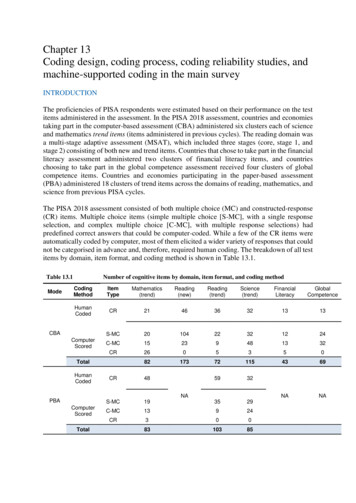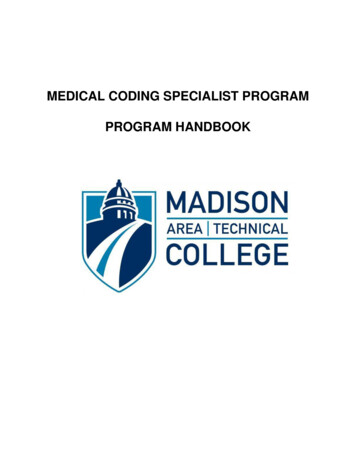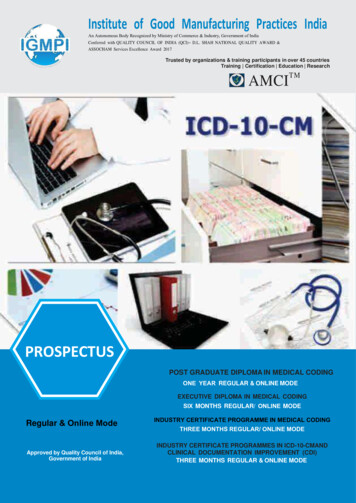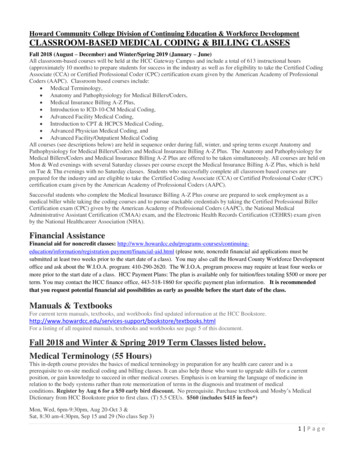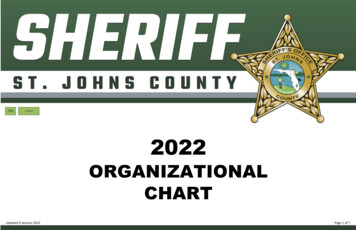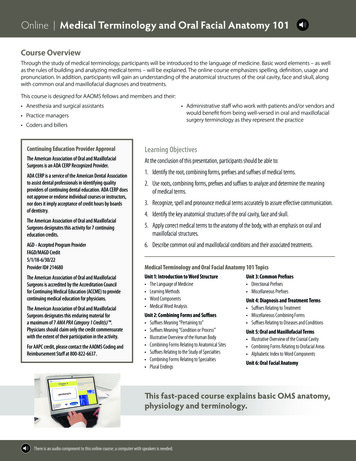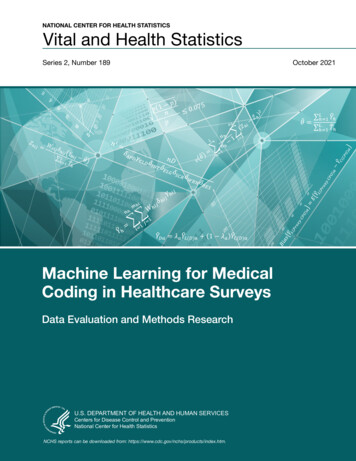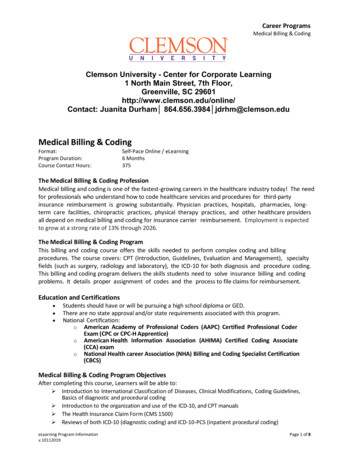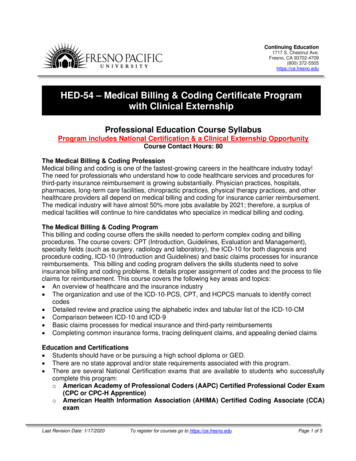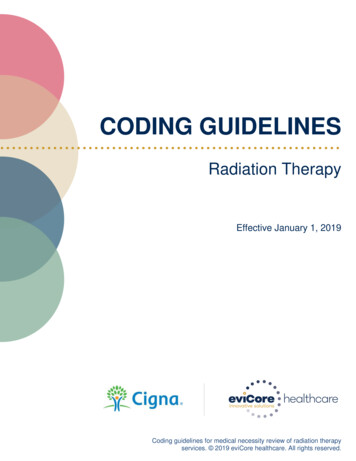
Transcription
MEDICAL CODING SPECIALISTPROGRAM HANDBOOKMedical Coding Specialist Program Handbook1
FORWARDThe Medical Coding Specialist Program Handbook provides students with a description of theprogram – its framework, program goals and description, program outcomes, and policies.The policies provided in this handbook are in effect throughout the program and supplement thepolicies and procedures published on the Madison College website. Please retain this handbook forreference until completion of the Medical Coding Specialist Program.Developed: May 2011Latest Revision: June 2021Medical Coding Specialist Program Handbook2
PROGRAM GOAL AND DESCRIPTIONThe Medical Coding Specialist Program (MCSP) prepares individuals for employment as entry-levelcoding specialists in health care facilities such as hospitals, clinics, physician practice groups, surgerycenters, long-term care facilities, and home health care agencies. Coding specialists are alsoemployed in consulting firms, coding and billing services, insurance companies, governmentalagencies, and computer software companies.The medical coding specialist reviews medical documentation provided by the physicians and otherhealth care providers and translates this into numeric codes. The coding specialist assigns andsequences diagnostic and procedural codes using universally recognized coding systems. Severaluses of coded data are for payment of health care claims, statistics, and medical research.PROGRAM OUTCOMESUpon completion of the program, the student will have the knowledge, skills, and professionalbehavior to enter the medical coding profession. The specific program outcomes are:Collect health data.Apply coding and reimbursement systems.Model professional behaviors and ethics.Use electronic applications to support coding and data collection.Medical Coding Specialist Program Handbook3
MEDICAL CODING SPECIALIST PROGRAM FACULTY AND STAFFMarsha Tweedy, Dean of the School of Health nda Voelz, Program Director & a Brunell, Full Time e Dean, Part Time Facultyjadean1@madisoncollege.eduJill Hadfield, Academic Advisor608-246-6076 @madisoncollege.eduPROGRAM INFORMATION AND POLICIESThe following program information and policies are arranged by subject in alphabetical order. Theappendices are at the back of the Handbook.ACADEMIC ADVISINGAcademic advising is available to all students from the Academic Advisors in Advising Services andfrom the Medical Coding Specialist Program instructors. Academic advising will promote success inthe program by making sure students are placed in the correct courses needed for graduation. TheDegree Progress Report (Academic Advising Report) is available online in the student’s“myMadisonCollege Portal.” Advising will also help students schedule course loads that areappropriate for their lifestyle; in other words, advisors will help students look at their school, work, andfamily responsibilities and the time needed for each.Learn more about the “myMadisonCollege -portalContact Advising Services to make an appointment with an Academic C INTEGRITYAcademic integrity is expected in all Madison College classes and professional developmentexperiences and seminars. Cheating, plagiarism, falsifying work, and other forms of academicMedical Coding Specialist Program Handbook4
dishonesty are prohibited. (Plagiarism is defined as passing of another person’s work as your own.)Students are obligated to conduct academic work with honesty and integrity according to MadisonCollege standards. Students who fail to observe these standards are subject to disciplinary actionwhich may include dismissal from the Medical Coding Specialist Program.For more information, please refer to the Madison College website MISSION PROCESSPlease refer to the information about the admission process on the Medical Coding SpecialistProgram webpage at: https://madisoncollege.edu/program/medical-coding. Click on the Admissiontab for details.ADVANCED STANDING – TRANSCRIPTED CREDIT (TRANSFER CREDIT)Courses taken at Madison College or at another college or university may fulfill some of therequirements for the Medical Coding Specialist Program. To have these courses considered foradvance standing, you must have official transcripts sent to Madison College Enrollment Center. Ifyou do not see anticipated transfer credit populated into your student record, you must complete theTransfer Credit Evaluation Request Form and submit the course syllabus for the desired course(s).This form can be found on the Madison College website at: https://madisoncollege.edu/transcriptcreditThe Transfer Credits staff will review the transcript and course syllabus to grant credit if appropriate;transcript must document a grade of “C” or better. Credit will only be granted for courses if theyare less than five years old at the time your application is processed.Credit for the coding courses (ICD Diagnosis Coding, ICD Procedure Coding, CPT Coding, AdvancedICD Coding, and Advanced CPT Coding) cannot be transferred from another program, college, oruniversity. The coding courses must be taken at Madison College or credit must be obtained bysuccessfully passing a challenge exam (test-out).As documented in the credit for prior learning policies and procedures on the Madison Collegewebsite, credits from prior learning (transfer or otherwise) may account for up to 75 percent ofrequirements toward a degree.Learn more at: VANCED STANDING – CREDIT FOR EXPERIENTIAL LEARNING(Challenge Exams)Students may obtain credit for a specific course by successfully completing the challenge exam or aportfolio. The process must be done prior to the beginning of the course and cannot be done if thestudent has withdrawn from or failed the course previously. The cost is 50 per challenge exam and 90 for portfolio review.A challenge exam is available for Windows. For more information, please see the ExperientialMedical Coding Specialist Program Handbook5
Learning page on Madison College’s website at: https://madisoncollege.edu/experiential-learning. Ifyou have questions about the Windows challenge exam, please contact Chris Yero atcyero@madisoncollege.eduChallenge exams are available for Body Structure & Function and Medical Terminology. A portfoliocan be completed for Digital Literacy for Healthcare. For more information, please see theExperiential Learning page on Madison College’s website at: https://madisoncollege.edu/experientiallearning. If you have questions, please contact Amy Lemkuil at alemkuil@madisoncollege.edu or byphone at 608-246-5283 for more information.Please contact Rhonda Voelz, Medical Coding Specialist Program Director, to plan for taking achallenge exam for the core program courses in the MCSP. Contact Info:rvoelz@madisoncollege.edu or 608-246-6015.Students may obtain credit for Certification and Professional Development (10-530-188) by showingproof of current coding certification from either the American Health Information ManagementAssociation (CCA, CCS, CCS-P) or the American Academy of Professional Coders (CPC, COC,CIC).As documented in the credit for prior learning policies and procedures on the Madison Collegewebsite, credits from prior learning (transfer or otherwise) may account for up to 75 percent ofrequirements toward a degree.Learn more at: TENDANCECore program classes in the MCSP are offered in the online format; some classes include an optionalonline live weekly session. Because the online live sessions are optional, attendance is not taken andrecorded. Students are expected to participate and meet the deadlines as posted by the instructor.CELL PHONESCell phones must be silenced during online live sessions and professional development experiencesand seminars.CERTIFICATIONThere are several certification exams that can be taken to earn national coding credentials. TheCertified Coding Associate (CCA) exam demonstrates entry-level skills. The other certification examsdemonstrate mastery level (experienced) skills. Many employers require certification. Certificationmay result in a salary increase and/or promotion. The certification exams are as follows:American Academy of Professional Coders (AAPC) Certified Professional Coder (CPC)Certified Outpatient Coder (COC) Certified Inpatient Coder (CIC)Certified Risk Adjustment Coder (CRC)Medical Coding Specialist Program Handbook6
American Health Information Management Association (AHIMA) Certified Coding Associate (CCA)Certified Coding Specialist (CCS)Certified Coding Specialist – Physician-Based (CCS-P)COMPUTER APPLICATIONS AND ELECTRONIC HEALTH RECORDBlackboard is the course management system used by Madison College to supplement face/facecourses and to deliver online courses. Blackboard is accessed via the Internet.During the core-program courses, students will use an electronic health record called EHR Go andcoding/reimbursement software in the AHIMA Virtual Lab. Access codes for these software productswill be purchased by the College and distributed to the students.Madison College Student Help Desk is available to assist students with technical issues (computer,Blackboard, email, etc.). Technology related issues are not an excuse for being late with or missingassignments, quizzes, exams, etc. Occasionally technical problems occur with Blackboard andInternet connections. If problems occur while a student is taking a quiz/exam and the Bb connectionis disrupted, the student may request the instructor to reset the quiz/exam in order to continue. If thisoccurs on a consistent basis (multiple times), the student will be asked to come to the MadisonCollege campus (main campus or regional satellites) to take the quizzes/exams.CONFIDENTIALITY AND PRIVACY OF HEALTH INFORMATIONThe Medical Coding Specialist Program at Madison College uses de-identified electronic healthrecords. Although the records have been de-identified, the students and faculty have the legal andethical responsibility to safeguard the privacy of all patients and protect the confidentiality of theirhealth information. Students must only access the patient confidential information for which they havea need to know in the context of their role as a student.Students must adhere to the Health Insurance Portability and Accountability Act of 1996 (HIPAA).Violation of patient privacy and confidentiality may result in corrective action up to and includingwithdrawal from the Medical Coding Specialist Program.COURSE PREREQUISITES OR CO-REQUISITESKnowledge gained in certain courses in the program is a prerequisite or co-requisite for subsequentcourses. Prerequisite refers to a course(s) that must have been successfully completed prior to thecurrent course. Co-requisite means that a course(s) can be taken concurrently with the currentcourse. Prerequisites must have been taken within the past five years. Please see Appendix Afor a listing of the courses and prerequisite/co-requisites.CURRICULUMPlease see Appendix B for the Medical Coding Specialist Program curriculum.Medical Coding Specialist Program Handbook7
DELIVERY/INSTRUCTIONAL FORMATThe core program courses are offered in the online format. Blackboard is the learning managementsystem used to deliver the online courses. Students need basic computer and keyboarding skills tobe successful.The following courses also have optional weekly online live sessions using WebEx videoconferencing software application. Please see Appendix D for the day/time of the optional online livesessions. ICD Diagnosis CodingICD Procedure CodingCPT CodingHealthcare Revenue ManagementAdvanced ICD CodingAdvanced CPT CodingPlease prepare for online classes by reviewing some remote learning tips on the Madison Collegewebsite at: https://madisoncollege.edu/remote-learning-tipsThe course delivery format is subject to change due to pandemics, natural disasters, or instructoravailability.DISABILITY RESOURCE SERVICES (DRS)Madison College welcomes students with disabilities into the College’s educational programs. EveryMadison College campus has Disability Resource Services available for students with disabilities andaccommodations for disability-related barriers.In order to receive consideration for reasonable accommodations for your disability, you must contactthe Disability Resource Services office at the campus where you are officially enrolled. If approved foraccommodations, Disability Resource Services will provide you with an accommodation plan. Thestudent should share the accommodation plan with each instructor and discuss the accommodationsneeded.This should be done before or at the start of each semester so there is ample time to make theaccommodations.Learn more at: vicesEMAIL – OFFICIAL COMMUNICATIONThe official means of communication with students is via the student’s Madison College emailaccount. Please check your Madison College email on a regular basis for importantinformation. When communicating with instructors and other Madison College staff, please use yourMadison College email instead of your personal email.Medical Coding Specialist Program Handbook8
Learn more at: GLISH LANGUAGE LEARNERS (ENGLISH AS A SECOND LANGUAGE)Students in the Medical Coding Specialist Program need to have proficient skill in using English inoral and written communication. Mastery of the English language is also necessary forcomprehension of written materials including the textbooks. The medical language (medicalterminology) seems like a second language in the MCSP and students who do not have a solidfoundation in English may find it difficult to use two new languages (English and medical) at the sametime.ESSENTIAL FUNCTIONSPlease see Appendix C for the Essential Functions of the Medical Coding Specialist.FAILURE OF OR WITHDRAWL FROM A COURSEStudents must receive a “C” (76%) or better in all courses in the Medical Coding Specialist Program(MCSP). If a student receives less than a “C”, he/she must repeat the course. Effort will be made toplace the student in the upcoming cohort to retake the core program course the following semester. Ifspace is not available or the needed course is not offered the following semester, the student mayneed to reapply to the MCSP and petition to be accepted again to have access to the core programcourses.If a student formally withdraws from a core program course effort will be made to place the student inthe upcoming cohort to retake the core program course the following semester. If space is notavailable or the needed course is not offered the following semester, the student may need to reapplyto the MCSP and petition to be accepted again to have access to the core program courses.If a student has failed/withdrawn from a core program course twice and would like to register for thecourse for the third time, he/she needs to complete the following steps to help ensure success thethird time the course is taken: Meet with an academic advisor in Advising Services and develop an academic plan. TheProgram Director and Dean of the School of Health Education may be included in thisdiscussion.Complete the Time Tool in Appendix E of the MCSP Handbook. Share this time tool with theacademic advisor.If a student has failed/withdrawn from a core program course three times, regardless of if thisoccurred in consecutive semesters, he/she will be removed from the program.FINAL EXAMINATIONS – PROCTOREDSome of the pre-program (pre-petition) courses in the Medical Coding Specialist Program haveproctored final examinations. Even if the course is taken online, there may be a proctored finalMedical Coding Specialist Program Handbook9
examination that the student needs to take in person at the Truax campus. Please refer to the coursesyllabus for each course at the beginning of the semester to learn about final examinationrequirements.GAINFUL EMPLOYMENTStudents have a right to know about gainful employment after graduation. Madison College isrequired by regulations to tell students about programs eligible for financial aid and their outcomes.Gainful employment reports inform students of the program costs, financing, and graduate success.This data may help you choose a program based on career and income potential and avoidunnecessary debt. Learn more at: https://madisoncollege.edu/dataGRADINGStudents must receive a “C” (76%) or better in all the courses in the Medical Coding SpecialistProgram. The following grading scale is -85%76-80%70-75%69% andbelowPlease refer to individual course syllabi and/or Blackboard sites for specific details on grading policiesincluding make-up work, credit for late work, participation in group activities, etc.MADISON COLLEGE WEBSITEThe Madison College website (www.madisoncollege.edu) provides a wealth of information at yourfingertips! The Madison College website includes information regarding counseling and disabilityresource services; financial aid; registration and records (withdrawals, refunds, grading, etc.) andgeneral school information. Special attention should be given to the information about student rightsand responsibilities (code of conduct, grade disputes, appeals process, etc.) The website alsocontains information about each program of study and the course descriptions.Students must activate their “myMadisonCollege” portal. From “myMadisonCollege”, students cando such things as access grades and transcripts, register for and withdraw from classes, check theirclass schedule, make account payments, change their address and phone information, scheduleappointments, and run their degree progress (academic progress) report. The date when studentsmay begin registering for classes for the next session/semester is posted in each student’s“myMadisonCollege” portal.Medical Coding Specialist Program Handbook10
Learn more at: ORIENTATION TO THE PROGRAMStudents are required to complete a short online Medical Coding Orientation/Petition Workshopcourse once their application has been processed. Completion is required for students to petition tobegin core program courses. Students will be notified and provided instructions to begin the onlineorientation course after their application has been processed.Students will be required to complete a time commitment survey and a short quiz in the onlineorientation course. This is verification that the student has completed the orientation and has receivedthe necessary program information. The following is the last question in the quiz; this serves asverification that the policies and procedures have been reviewed:I have received an electronic copy of and read the Medical Coding Specialist Program (MCSP)Handbook. I have retained a copy, either electronically or in paper, for future reference. I understandadditional policies and procedures are contained on the Madison College website and in individualcourse syllabi and Blackboard sites.I understand failure to abide by the Madison College and MCSP policies and procedures may resultin disciplinary action including dismissal from the MCSP.PRE-PETITION STATUS AND PETITION PROCESSAfter the initial application is processed, students are placed in the pre-petition status. During thistime, students will need to: Complete the program’s prerequisite requirements for Algebra, English, and ReadingComplete the pre-petition course requirements (Windows, Digital Literacy for Healthcare, BodyStructure & Function, and Medical Terminology). Please note these courses have a fiveyear time limit.Complete the online Medical Coding Orientation/Petition Workshop course in BlackboardPlease refer to the detailed instructions at: https://madisoncollege.edu/petition-processThe petition process is the method that students follow to tell Madison College when they are readyand prepared to begin the core program courses (Clusters 1-3). Of the students who petition, twenty(20) will be selected to begin Cluster 1 core program courses each semester. Priority for entry intocore program courses will be given to those students who have all requirements completed at thetime of petitioning. If all spots are not filled by students who have all the petition requirementscompleted, the remaining petitions will be reviewed, and any open spots will be tentatively awarded toqualified petitioners who are in-progress with the remaining requirements. The tentatively awardedspots will become permanent only after the student successfully completes the remaining in-progressrequirements.Students can monitor their petition requirement completion through their degree progress (academicprogress) report. Students can contact Jill Hadfield at jhadfield@madisoncollege.edu oradvising@madisoncollege.edu or call 608-246-6076 to schedule an appointment if there are anyMedical Coding Specialist Program Handbook11
questions.Please see the detailed instructions on how and when to petition DULEPlease see Appendix D for the schedule for the core program courses. Students are required to takethe core program courses cluster by cluster (Cluster 1 before Cluster 2; Cluster 2 before Cluster 3).The courses for each cluster should be taken together in the same semester. This schedule alsoshows the day/time of the optional online live sessions.SYLLABUSA course syllabus is prepared for each course in the program. The following information is commonlyfound in the course syllabus: course number, title and description, credits, course competencies,required textbooks, instructor information, and a course timeline. The syllabus also includes coursepolicies related to academic accommodations, attendance, and grading. It is the student’sresponsibility to read and understand the course syllabus for each course. The course syllabus isposted on the Blackboard site for each course. Students are strongly encouraged to retain a digitalcopy of the syllabus for each course as this may be required for further education in the healthinformation management profession.TIME COMMITMENTSuccess in the Medical Coding Specialist Program (MCSP) requires a major time commitment –going to college is almost like a full-time job. A general rule of thumb is that students should expect todevote a minimum of 3 hours per week for each course credit. For example, a 3-credit courserequires a minimum of 9 hours of time per week. Of course, there are many variables that affect thetime commitment needed for success in each course. Some of these include the student’s prioreducational and work experience, study habits, learning style, ability to process and retain informationand ability to study in a quiet, uninterrupted manner.Please refer to Appendix E for the time commitment required for the courses/clusters in the MCSP.WITHDRAWAL FROM A COURSEIt is strongly recommended that a student who desires to withdraw from a course discuss thewithdrawal with his/her instructor prior to doing so. It is the responsibility of the student to officiallywithdraw; a student may withdraw online through his/her “myMadisonCollege” portal.If a student formally withdraws from a core program course effort will be made to place the student inthe upcoming cohort to retake the core program course the following semester. If space is notavailable or the needed course is not offered the following semester, the student may need to reapplyto the MCSP and petition again to have access to the core program courses.If a student has failed/withdrawn from a core program course twice and would like to register for thecourse for the third time, he/she needs to complete the following steps to help ensure success theMedical Coding Specialist Program Handbook12
third time the course is taken: Meet with an academic advisor in Advising Services and develop an academic plan. TheProgram Director and Dean of the School of Health Education may be included in thisdiscussion.Complete the Time Tool in Appendix E of the MCSP Handbook. Share this time tool with theacademic advisor.If a student has failed/withdrawn from a core program course three times, regardless if thisoccurred in consecutive semesters, he/she will be removed from the program.Medical Coding Specialist Program Handbook13
APPENDIX A – COURSE PREREQUISITES OR CO-REQUISITESKnowledge gained in certain courses in the program is a prerequisite or co-requisite for subsequentcourses. Prerequisite refers to a course(s) that must have been successfully completed prior to thecurrent course. Prerequisites must have been taken within the past five years. Co-requisitemeans that a course(s) can be taken concurrently with the current course.Red – Pre-Program (Pre-Petition) CoursesGreen – Cluster 1 Core Program CoursesBlue – Cluster 2 Core Program CoursesOrange – Cluster 3 Core Program CoursesCoursePrerequisiteCo-requisite10-103-121 – Windows 10NoneNone10-501-107 – Digital Literacy for HealthcareNoneNone10-501-153 - Body Structure & FunctionNoneNone10-501-101 - Medical TerminologyNoneNone10-530-162 – Foundations of HIMPre-ProgramCoursesOther Cluster 1Courses10-530-182 – Human Diseases for the Health ProfessionsPre-ProgramCoursesOther Cluster 1Courses10-530-197 – ICD Diagnosis CodingPre-ProgramCoursesOther Cluster 1Courses10-530-199 – ICD Procedure CodingCluster 1CoursesOther Cluster 2Courses10-530-184 – CPT CodingCluster 1CoursesOther Cluster 2Courses10-530-159 – Healthcare Revenue ManagementCluster 1CoursesOther Cluster 2Courses10-530-189 – Management of Coding ServicesCluster 1CoursesOther Cluster 2Courses10-530-168 – Advanced ICD CodingCluster 2CoursesOther Cluster 3Courses10-530-187 – Advanced CPT CodingCluster 2CoursesOther Cluster 3Courses10-530-188 – Certification & Professional DevelopmentCluster 2CoursesOther Cluster 3CoursesMedical Coding Specialist Program Handbook14
APPENDIX B - MEDICAL CODING SPECIALIST PROGRAM CURRICULUMThe Medical Coding Specialist Program (31-530-2) is offered on a part-time basis only. Pre-program (pre-petition) coursesmust be successfully completed before the student begins the core program courses. Core program courses must betaken in clusters as listed below.Pre-Program (Pre-Petition) Courses – Students are required to take these courses before they begin the core programcourses. These courses are usually offered in various formats such as in-person, hybrid (blended), online, or online live.CoursesCreditsLab-Lecture Hours Per Week10-501-153 Body Structure and Function OR33-020-806-206 General Anatomy & Physiology *(4)(3-2)*General A&P is recommended for those who plan to pursue anassociate degree and/or a bachelor’s degree.10-501-101 Medical Terminology33-010-103-121 Windows 101.25-1.510-501-107 Digital Literacy for Healthcare21-2Core Program Courses – Students are required to take these courses cluster by cluster (Cluster 1 before Cluster 2;Cluster 2 before Cluster 3). The courses for each cluster must be taken together in the same semester. These coursesare offered in the online format; some courses have optional online live weekly sessions.Cluster 1 CoursesCreditsLab-Lecture Hours Per Week10-530-162 Foundations of HIM32-210-530-182 Human Diseases for the Health Professions33-010-530-197 ICD Diagnosis Coding32-2Cluster 2 Courses10-530-199 ICD Procedure Coding10-530-184 CPT Coding10-530-159 Healthcare Revenue Management10-530-189 Management of Coding ServicesCredits2331Lab-Lecture Hours Per Week1-22-22-21-0Cluster 3 Courses10-530-168 Advanced ICD Coding10-530-187 Advanced CPT Coding10-530-188 Certification and Professional DevelopmentCredits332Lab-Lecture Hours Per Week2-22-21-2Total Credits35Medical Coding Specialist Program Handbook15
APPENDIX C - ESSENTIAL FUNCTIONS OF THE MEDICAL CODING SPECIALISTDuring the Medical Coding Specialist Program, students must demonstrate, with or without reasonable accommodationsto policies and practices, the ability to perform the functions listed below safely, reliably, and efficiently.ISSUESTANDARDEXAMPLESCritical ThinkingCritical thinking abilitysufficient for clinicaljudgment and professionalbehavior. Identify cause-effect relationship in clinical setting.Correlate theory to practice.Abstract information from patient records for coding, research studies, and qualityimprovement projects.Apply coding guidelines and conventions including proper sequencing of codes.Correlate and review DRG, APC & RBRVS payment methodology to coded data.Review and correct denied claims.Appropriately use and apply authoritative resources.ReadingAbility to read andunderstand writtendocumentation. Adequately read paper and electronic health records.Read publications, paper and digital, such as federal/state regulations, Medicare policies,and professional journals.EmotionalEnduranceAbility to work in a highstress and rapidly changingenvironment with multipledeadlines while maintainingemotional control andflexibility. Calmly react to urgent situations.Focus attention on task at hand.Adapt to changing environment.Accept feedback appropriately.Accept responsibility of own actions.InterpersonalSkillsInterpersonal abilitiessufficient to interact withpeers, coworkers,physicians, third partypayers, and other groupsfrom a variety of social,emotional, cultural, andintellectual backgrounds. Establish good rapport with classmates, instructors, and healthcare professionals.Be sensitive to needs of others.Work together to reach a common goal (team player).Effectively de-escalate a situation.Communic
Medical Coding Specialist Program Handbook 4 MEDICAL CODING SPECIALIST PROGRAM FACULTY AND STAFF Marsha Tweedy, Dean of the School of Health Education 608-246-6065 mtweedy@madisoncollege.edu Rhonda Voelz, Program Director & Faculty 608-246-6015 rvoelz@madisoncollege.edu Loretta Brunell, Full Time Faculty 608-246-6511
